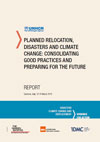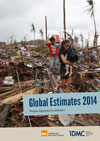-
Displacement Planning Critical for Climate Change Strategies, Studies Show
September 24, 2014 By Heather Randall Planned relocation should be a major component of national strategies for disaster risk management, climate change, and development, says a recent report by the UN High Commissioner for Refugees (UNHCR). The report comes as the result of an expert consultation held in Sanremo, Italy, in March of last year amid increased research linking the effects of climate change with migration and displacement. Key components of planned relocation, according to UNHCR, include a state-led, last-resort process to move populations in the face of potential hazards, including natural disasters as a result of climate change. Significantly, UNHCR says planned relocation should be done in a way that “safeguards civil, political, cultural, social, and economic rights of individuals and communities.” The report provides recommendations for implementing effective planned relocation strategies, including developing guidance documents for governments, ensuring that decision-makers are held accountable to affected populations, and providing sufficient funding to operationalize, monitor, and evaluate relocation programs.
Planned relocation should be a major component of national strategies for disaster risk management, climate change, and development, says a recent report by the UN High Commissioner for Refugees (UNHCR). The report comes as the result of an expert consultation held in Sanremo, Italy, in March of last year amid increased research linking the effects of climate change with migration and displacement. Key components of planned relocation, according to UNHCR, include a state-led, last-resort process to move populations in the face of potential hazards, including natural disasters as a result of climate change. Significantly, UNHCR says planned relocation should be done in a way that “safeguards civil, political, cultural, social, and economic rights of individuals and communities.” The report provides recommendations for implementing effective planned relocation strategies, including developing guidance documents for governments, ensuring that decision-makers are held accountable to affected populations, and providing sufficient funding to operationalize, monitor, and evaluate relocation programs. Another recent report, from the Norwegian Refugee Council, highlights the impact of disasters on displacement worldwide. In 2013, 22 million people were newly displaced by disasters, almost three times as many as those displaced by conflict. People in countries that experience both conflict and natural disasters are at even greater risk for displacement, as “conflict undermines the ability of governments and NGOs to plan for the onset of natural hazards and protect people from them.” As a result, some people experience multiple bouts of displacement. There has been an overall upward trend in numbers of people displaced by disasters since 1970 due to population growth, the report says, particularly in the developing world. Better data collection could also lead to a reporting bias for certain countries. The Council finds that many national climate change adaptation plans do not include ways of measuring the risk and impact of displacement, limiting states’ abilities to address the issue and recommends policymakers and funders invest in “measures that address people’s underlying vulnerability to extreme weather patterns.”
Another recent report, from the Norwegian Refugee Council, highlights the impact of disasters on displacement worldwide. In 2013, 22 million people were newly displaced by disasters, almost three times as many as those displaced by conflict. People in countries that experience both conflict and natural disasters are at even greater risk for displacement, as “conflict undermines the ability of governments and NGOs to plan for the onset of natural hazards and protect people from them.” As a result, some people experience multiple bouts of displacement. There has been an overall upward trend in numbers of people displaced by disasters since 1970 due to population growth, the report says, particularly in the developing world. Better data collection could also lead to a reporting bias for certain countries. The Council finds that many national climate change adaptation plans do not include ways of measuring the risk and impact of displacement, limiting states’ abilities to address the issue and recommends policymakers and funders invest in “measures that address people’s underlying vulnerability to extreme weather patterns.”Sources: Norwegian Refugee Council, United Nations High Commissioner for Refugees.
 A Publication of the Stimson Center.
A Publication of the Stimson Center.








